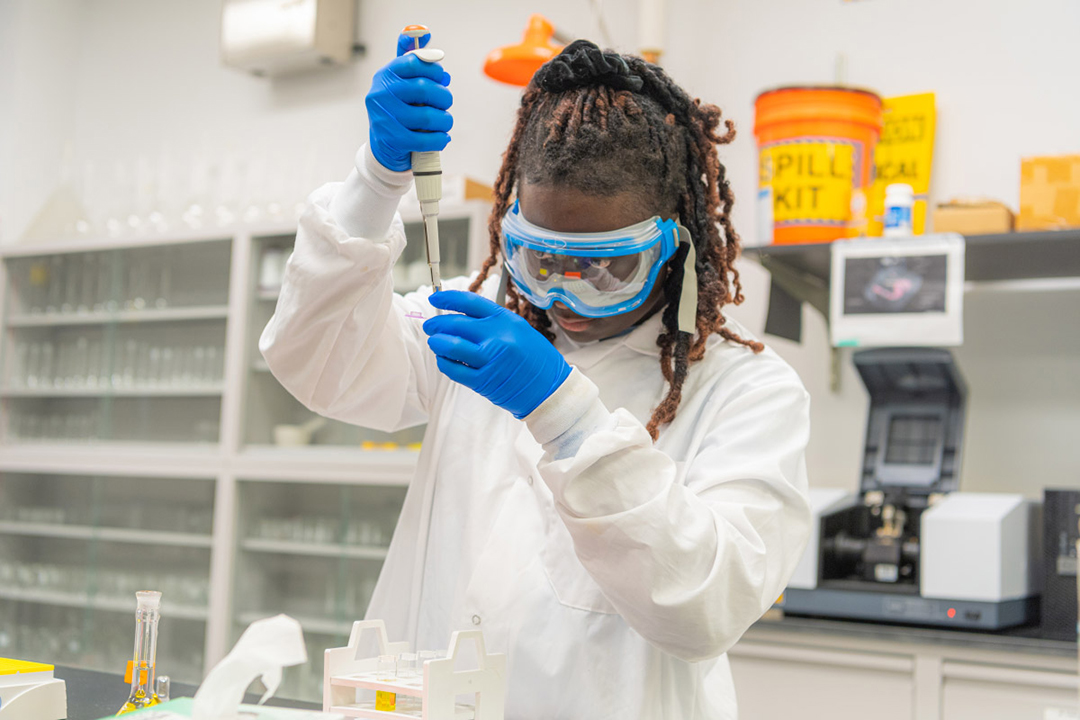RIT/NTID receives federal funding appropriation from 2024 Omnibus budget
Matthew Sluka
Funding for RIT/NTID through the FY24 federal appropriations bill provides educational opportunities for deaf students like Maameyaa Asiamah, a biochemistry major from Fairfax, Va.
U.S. Senate Majority Leader Charles Schumer, U.S. Sen. Kirsten Gillibrand (D-NY), and Rep. Joseph Morelle announced that Rochester Institute of Technology’s National Technical Institute for the Deaf has received $92.5 million for fiscal year 2024, which is level funding from 2023, with NTID’s Regional STEM Center receiving $9.5 million, as it did in fiscal year 2023.
The funding was included as part of the fiscal year 2024 omnibus budget package, which will fund the government and its various agencies. H.R. 2882, the “Further Consolidated Appropriations Act, 2024,”…which provides funding through September 30, 2024, for projects and activities of departments and agencies of the Federal Government,” was signed into law by President Joseph R. Biden March 23.
RIT
From left to right, Senate Majority Leader Charles Schumer, Sen. Kirsten Gillibrand, and Rep. Joseph Morelle
“As one of our nation’s premier schools for deaf and hard-of-hearing students, the National Technical Institute for the Deaf at RIT equips bright young minds with the essential tools for success in both academia and the professional world,” Sen. Schumer said. “I am proud we secured $92.5 million in this year’s federal appropriations bill so that NTID can persist in its crucial mission, empowering our deaf and hard-of-hearing students to realize their fullest potential. By bolstering NTID we are investing in the economic vitality of the Rochester Finger Lakes region and beyond, as the institute's graduates are well-prepared to fill key roles in high-demand sectors.”
“NTID is a one-of-a-kind institution that provides deaf and hard-of-hearing students with a world-class college education and the skills to thrive in the workforce,” said Sen. Gillibrand. “Every year, I lead the fight to get funding for NTID included in the government spending bill, and this year, I’m proud to be delivering another $92.5 million. This funding will not only help serve the college students at NTID, but also allow NTID to support its Regional STEM Center, which provides STEM career exploration and college preparation to deaf and hard-of-hearing middle and high school students. This innovative program will help ensure that these students can excel in the 21st century workforce. I will always be a staunch advocate for NTID and I look forward to continuing to deliver federal funding and resources to this incredible institution.”
“We are fortunate to have the National Technical Institute for the Deaf (NTID) right here in Rochester, an institution which provides transformative education and allows deaf and hard-of-hearing students to reach their full potential,” Rep. Morelle said. “I’m proud to have worked alongside my colleagues Majority Leader Schumer and Senator Gillibrand to deliver this funding to strengthen NTID’s life-changing resources and opportunities for our vibrant deaf community. I look forward to continuing my advocacy in Washington to support NTID and ensure they can serve our community for decades to come.”
In a statement to the RIT/NTID community, NTID President and RIT Vice President and Dean Gerry Buckley said, “Level funding is truly a huge win for NTID. Once again, Senate Majority Leader Schumer, Sen. Gillibrand, and Rep. Morelle prioritized NTID’s appropriation, reaching out to colleagues and staffers on our behalf to ensure that our funding was maintained and protected. We are incredibly lucky to have their support and the broader support of Congress for our students and mission. They have succeeded once again in delivering the funding we need to support our students and provide the education, mentorship, community, and access that lead to their success here at NTID and out in the workforce and larger community. Senator Schumer, Senator Gillibrand, and Congressman Morelle are great partners who have improved the lives of thousands of deaf and hard-of-hearing young people.”
The funds enable NTID to maintain access services, instruction, and technology, as well as continue outreach programs to better prepare middle and high school students for the workforce and/or postsecondary education.
One of nine colleges of RIT, NTID was established by an Act of Congress in 1965 to educate and prepare deaf and hard-of-hearing students for employment in a growing and changing global economy. It is the world’s first and largest technological college for deaf and hard-of-hearing students.
In addition, RIT received $1.25 million in funding from the recent appropriations bill to expand its Battery Prototyping Center. The funding will be part of national directions to strengthen the battery ecosystem in the U.S.














